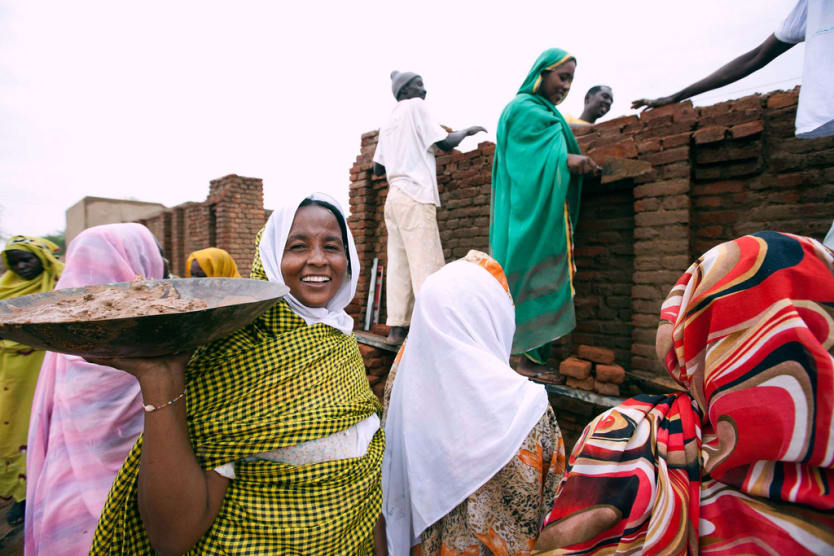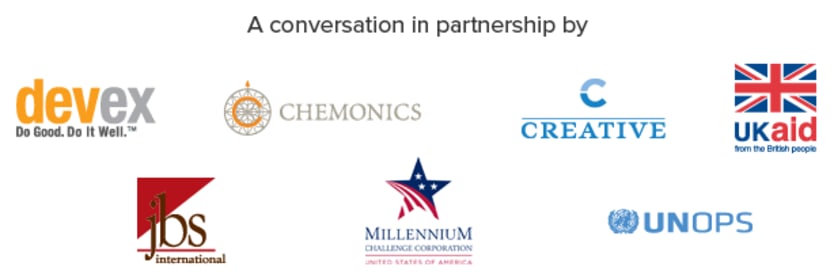
A global snapshot of today’s top political leaders reveals that only one out of five national parliamentarians is female, and there have only been some 20 women elected head of state or head of government.
The exclusion of women from the highest echelons of power in the formal political sphere is glaring, and it’s in stark contrast to the role women actually play in building communities around the world.
Despite legal impediments, cultural norms, household responsibilities and child rearing — and even without access to education — many women have broken glass ceilings in their communities and taken on leadership roles in building peace, resolving conflict, addressing gender-based violence, and improving public health and education.
Here are several innovative approaches #SheBuilds Communities — and ways the international communities can assist.
Strategic engagement with men
Teresita and Gemma, two mothers in Manila’s Pandacan district, could no longer remain apathetic toward regular incidents of child abuse in their community. They mobilized parents to form Bantay Bata sa Komunidad, initially with the objectives of preventing and responding to reports of child abuse.
This commitment kept them away from home late at night and during weekends, a radical departure from the traditional duties of mothers in the Philippines. This didn’t sit well with their husbands, at least at the start.
“Do you want me to just leave your clothes and belongings at the community center?” Gemma’s husband once complained.
The women found a way to reconcile family life with their new role as community leaders. They invited their husbands to meetings and consultations. Upon seeing their wives speak on stage, many of these men felt a sense of pride and began to invest in the program. Today, their husbands are enthusiastic members and attend many of the events.
The success of Bantay Bata sa Komunidad lies in the shift in how its female participants viewed men — from perpetrators to partners — which informed their workshops and training sessions on parenting. Here, notions of fatherhood and masculinity were redefined to emphasize respect and care for the family as opposed to aggression and entitlement. The endeavor was framed as an attempt to strengthen family, not a struggle for power within the household.
Craig Packer, senior writer at JBS International, cautions against assuming that gender inequality persists only in developing countries.
“If we are going to criticize other cultures about how they treat women and girls, we need to be just as harsh on ourselves,” says Packer, who’s also the founder of Stop the Worldwide War on Girls, a 2-year old Facebook-based campaign with more than 25,000 members in more than 50 countries.
In many parts of the United States, women experience sexual assault. Packer suggests the different sets of rules for men and women are largely to blame.
A testament to how engaging men does pay off, he reveals: “Almost everything I read or see on the news goes through a ‘gender filter’ in my brain that did not exist five years ago — when the Super Bowl was approaching, I wondered how many women and girls would be trafficked to accommodate the Super Bowl sex market.”
Strategically engaging men can help women assume leadership roles in their communities.
Making the ‘business case’
Discussions around gender are never easy.
“Unfortunately — and unbelievably — sometimes talking about gender or women’s issues makes people shut down,” says Laura Henderson, director of education policy at Women Thrive Worldwide. One effective way to advocate for women’s issues, she suggests, is to weave a gendered lens into issues people are already working on, such as economic opportunity, peace and stability, or environmental conservation.
One way of doing this has been to demonstrate how gender equality is central to achieving development outcomes. No less than Amartya Sen, the Indian economist and Nobel laureate, makes the argument that investing in women and girls creates sustainable social and economic change.
Caren Grown, a former senior gender adviser at the U.S. Agency for International Development, suggests that there is now strong evidence to support this argument: An increase in women farmers’ access to productive resources has led to an increase in their yields on their farms, which helps improve global agricultural productivity and food security, and income earned by women tends to be spent on goods that benefit families, including children’s nutrition and education, which boosts long-term productivity.
Major international development players such as USAID and the U.K. Department for International Development have taken the cue and heavily invested in research to track the connection between women’s empowerment and broader economic growth.

Co-opting religious and community norms
Malala Yousafzai, the Pakistani teenager whose advocacy for girls’ education has captivated the world, says she doesn’t identify herself as “feminist,” avoiding the term associated with secularism and the West. By arguing that “Islam tells us every girl and boy should be educated,” Malala and her peers situate women’s rights within Islam, not against it. They proudly subscribe to the same religion as her attackers.
The result: a public conversation about the basis for gender equality within the Quran instead of an outright dismissal of her cause as an imposition by “outsiders.”
According to Grown, women leaders achieve more traction by enlisting the support of individuals who are widely respected in the community, such as tribal or religious leaders.
“People want to feel like they’re part of the solution, so they will not feel threatened,” says Carla da Rosa Borges, senior associate at the Communities in Transition Division of Creative Associates International, the U.S. consulting firm.
Local knowledge and capacity building
In her work with various tribes around the globe, Carlette Randall has seen the vulnerabilities that women and children experience in their daily lives, including sexual assault, domestic violence and rape.
Randall is a first language Lakota (Sioux) speaker raised in the Pine Ridge Indian Reservation in South Dakota and a senior Native American specialist at JBS International. She has helped several tribes develop their own evaluation processes for programs that address child welfare and domestic violence.
She is critical of top-down approaches to development.
“For too long, it is commonly understood now that research models and paradigms have ignored or left little input to the communities being probed and researched,” Randall says, noting that JBS’s engagement principles require respect for the dignity and sovereign rights of tribal communities “to have input into their own respective programs that affect their children.”
A strong understanding of local context and a focus on building the capacity of local actors define the most successful programs, says da Rosa Borges. But she cautions against approaches that make marginalized groups “fit into a system that is difficult for them to access or understand.”
For instance, in some parts of Afghanistan, women can’t leave their houses, so how do they go to a clinic when they need prenatal care? Only locals would be able to devise culturally acceptable strategies and communicate them effectively.
That’s why women’s advocates aggressively lobbied the U.S. government to ensure that both its Strategy to Prevent and Respond to Gender-based Violence Globally and USAID’s Gender Equality and Female Empowerment Policy were informed by the perspective of women who would be impacted by these policies. Women Thrive brought in an advocate from Haiti to testify before Congress about realities on the ground, and it continues to facilitate events at the United Nations that bring voices from the Global South directly to high-level decision-makers.
Displaying electoral power
The founding mothers of BKK still recall when local town leaders would not make time to meet them and they had to keep returning to government offices to be given a chance to air their concerns.
Today, they don’t have to chase anyone, and tables have turned. Local government officials regularly invite BKK members to serve as speakers in parenting seminars. Their services as conflict mediators are sought-after in the community — from dealing solely with child abuse cases, they now sit on local councils that deliberate on disputes around land, theft, unpaid debts and other issues.
Some of them have run for local office and won. Political candidates seek their endorsement. They are regularly stopped on the street and regarded as community heroes.
Their weapon? A strong core group that sought training from more established local nongovernmental organizations such as the Visayan Forum Foundation and a systematic process of reaching out to more people in the community based on shared interests. From 300 families, they now number 3,000, and they are politically engaged, calling local officials into account and articulating their demands.
These successes are inspiring, but challenges remain. Samira Hamidi, director of Afghan Women’s Network, was part of the 2010 National Peace Consultative Jirga in Afghanistan. During the president’s speech, rockets exploded near the Jirga tent. Her family pleaded her to stay away for the remainder of the event.
Compared to many other countries, Afghanistan’s constitution is progressive in terms of quotas for women in government positions, Hamidi says. However, “representation does not only refer to the number of women in structures; it must include the level of authority and role women have in making decisions.” Their appointments should be based on capacity and experience rather than personal connections, she suggests.
Institutions like the U.N. Office for Project Services and Millennium Challenge Corp. as well as many of their implementing partners have made great strides in gender mainstreaming.
And yet, more often than not, such efforts remain a work in progress.
Want to learn more? Check out She Builds and tweet us using #SheBuilds.
She Builds is a month-long conversation hosted by Devex in partnership with Chemonics, Creative Associates, JBS International, the Millennium Challenge Corp., United Nations Office for Project Services and U.K. Department for International Development.








